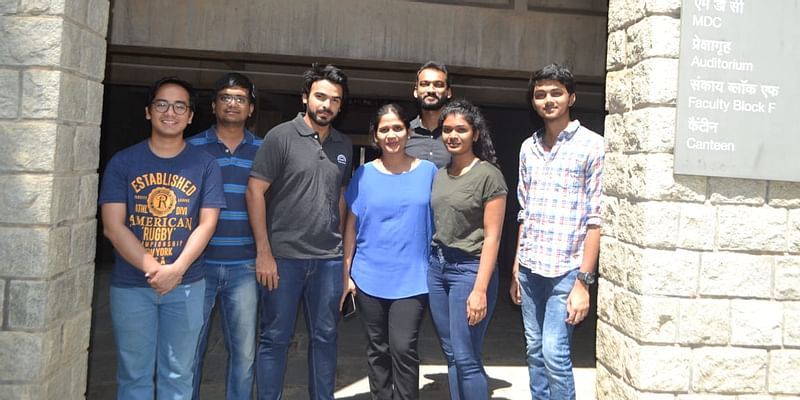This IIM Bangalore incubated startup aims to digitise all institutions, universities, and accelerators
Cunomial Technologies provides cloud-based, cost-effective, and next-generation digital products for institutions of all sizes in all industries to help digitise during the pandemic.
When the pandemic-led lockdown was announced in March this year, schools, colleges, universities, accelerators, and incubators had to shift to a digital model overnight. To quickly address the need of the hour, startups like Cunomial Technologies came to their aid.
Started in June 2018 by Sonali Jha, Cunomial Technologies provides cloud-based, cost-effective, and highly-available next-generation digital products for institutions of all sizes in all industries. It is incubated at IIM Bangalore and has been a part of Goldman Sachs 10K, and Google Launchpad programmes.
Sonali decided to start up shortly after she received the ‘Best Idea in the Product Design’ category in a Business Case Challenge by The New York Times. She eventually gave up her lucrative career, which spanned across 10 years with The New York Times, Cold Spring Harbor Laboratory, and Goldman Sachs.

Sonali Jha
Speaking to YourStory, Sonali Jha, Founder and CEO, Cunomial Technologies, says,
“I enjoyed my job, but I wanted to solve the problems faced by institutions in digitalisation. I decided to build best-in-class, cloud-native, and innovative SaaS products for institutions to help them achieve better efficiency, decision making, and productivity. Also, there is this amazing feeling while creating jobs and seeing our client institutions reach their potential by adopting digital tools, and by knowing that we made a positive impact in their day to day work through our leadership, ideas, and efforts.”
The workings
The idea of Cunomial is to empower institutions and organisations to leverage technology effectively while streamlining their administarative work. The startup does this by delivering technology innovations through cloud-based, cost-effective, and next-generation digital products.
The products are delivered through a SaaS business model, where customers can rapidly deploy the startup’s products with minimal upfront implementation. The customers also benefit from regular software updates.
Though the startup refused to share how much it charges for its products to its clients, Sonali says, “Our SaaS business model reduces the need for our customers to buy and support a broad range of IT infrastructure. It also reduces the cost, complexity, and disruptions associated with implementations and upgrades of on-premise software.”

Cunomial product offerings include:
Accubate – an incubator and accelerator management system — takes full care of accelerators and incubators operations and saves time from administrative tasks with Cunomial’s automated systems.
MeetIn – a multi-party video conferencing and webinar system — conducts online conferences and other collaborative sessions including webinars, webcasts, and web meetings.
OnePe – a platform-independent form-based payment collection system — generates invoices, sends reminders, receives fee payments, and is integrated with bookkeeping.
Learn – a learning management system — provides management capabilities for collaboration, meetings, calling, and apps in one place with simple administration.
Work – a career development system — focuses on career plans and development.
Sonali realised the inadequate technical infrastructure and the unavailability of skilled manpower to adopt and use digital products posed the two most critical challenges faced by most institutions.
Cunomial intends to bridge this digital divide by providing easy-to-use and simple cloud-native products with no infrastructure requirements and best-in-class customer support for appropriate adoption and usage. The advisors and mentors for the startup include Professor Sunil Handa from IIM Ahmedabad and Nagaprakash from IIM Bangalore.
Client base
Cunomial caters to several clients, including IIT (BHU) Varanasi; Northern Coalfields Limited; Indo German Tool Room, Indore; CSIR – National Environmental Engineering Research Institute; Bizskills; The Indian Agricultural Research Institute (IARI); Indira Gandhi Krishi Vishwavidyalaya; Assam University; Dayanand Sagar University; Presidency University; JNKVV; Sher-e-Kashmir University; Vyoma Artspace and Studio Theatre; You&MeTheatre; and South Korean National IT Industry Promotion Agency.
“We work primarily in the software-as-a-service business model with customers. For recurring services, we create one deal per year with an amount equivalent to the year of service, or create recurring deals each month,” says Sonali.
Presently bootstrapped, Sonali says the team pumped in Rs 2 crore of personal savings into building the initial product.
Market and future
A report by RedSeer and Omidyar Network India says the coronavirus pandemic has proved to be one of the biggest game-changers for India’s edtech sector. Online education offerings for Classes I to XII are projected to increase 6.3 times by 2022, creating a $1.7 billion market.
Cunomial sees startups like and , who are focussed on the educator side of the market as its competitors.
In the coming years, the startup is looking to build more innovative products. It is also looking at expanding its team and product reach.
Speaking of the startup’s future plans, Sonali says, “We are also planning to work on partnering with key companies in the Middle East, Europe, and the United States to expand our solution capability.”
Edited by Suman Singh













